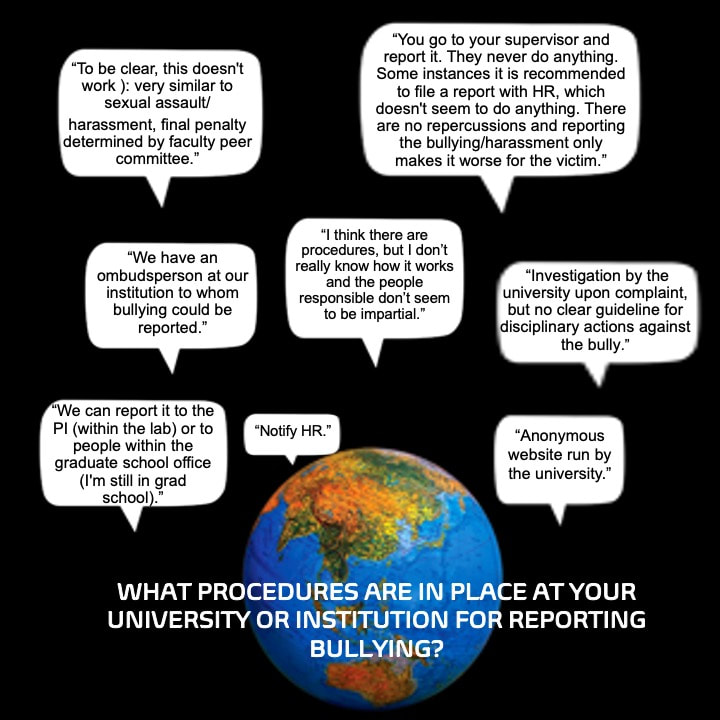The prevalence and impact of bullying on academics: summary of results from an international survey1/8/2022 Nafisa M. Jadavji PhD1,2,3, Emily Furlong PhD1, Gyan Prakash Mishra MS1,3 1 Ambassador Program, eLife Community, Cambridge, UK 2 Biomedical Sciences, Midwestern University, Glendale, AZ, USA 3 Infectious Disease Biology, Institute of Life Sciences, Bhubaneswar, India  Figure 1. Responses to the question asking survey respondents what procedures in place at their university or institution to report bullying. Our international findings showed that there is a wide variety of procedures in place to report bullying at academic institutions. Figure 1. Responses to the question asking survey respondents what procedures in place at their university or institution to report bullying. Our international findings showed that there is a wide variety of procedures in place to report bullying at academic institutions. We are a group of early-career researchers working to highlight the prevalence of bullying in academia, and our first blog post in November 2019, served to raise awareness of the issue through a series of stories from people around the world who have faced being bullied in academia. To follow up, we ran a voluntary international survey for four months (December 2019 to March 2020). The survey was promoted via social media and through personal networks. Because of the global pandemic we have had some delays with sharing our results. The survey attracted a total of 364 respondents that comprised of undergraduates, graduate students, postdocs, research associates, and principal investigators. The majority of respondents were from North America and Europe, with females making up 64%, males 34%, and the remaining 2% choosing not to identify. We would like to highlight that 76% of our respondents identified that they were bullied during their academic career. This included feeling belittled when presenting their data at an academic meeting (59%). But, only 33% of respondents had approached a relevant authority (e.g. supervisor, human resources) at their institutions about being bullied, which hints at the practice of normalizing behavior or a fear of retribution. Only 51% of the respondents knew that workplace bullying is a punishable offence that could lead to disciplinary action. This leaves us wondering whether organizations can do more to highlight the consequences of engaging in bullying during the recruitment or funding process. While 47% percent of respondents said that they would provide emotional support if they observed a colleague that was being bullied, a small number of respondents reported facing consequences, such as intimidation for having supported their colleagues. In Figure 1, we have summarized our findings on what universities and institutions worldwide are doing to help people who experience bullying. The answers vary greatly and show that some policies are not effective. The impact of being bullied in academia on the victims’ career plans are not well known (Klein and Lester, 2012). In our survey, 45% of respondents said that being bullied did impact their career in academia, this result requires further investigation. The results of our survey, and the fact that reports of bullying in academia have been increasing over the past decade (Klein and Lester, 2012), highlight that it is time to address the issue. At present, there are limited numbers of resources that are available as support for anyone that has experienced bullying in academia. We as a group of early-career researchers, aim to next create an online platform where victims can get resources and also share their stories to get advice. We also think research institutions worldwide need to create policies that are targeted at helping victims and that this help does not in fact harm the victim and future career opportunities. Acknowledgements: Renuka Kudva PhD
1 Comment
|
Archives
December 2023
Categories |

 RSS Feed
RSS Feed